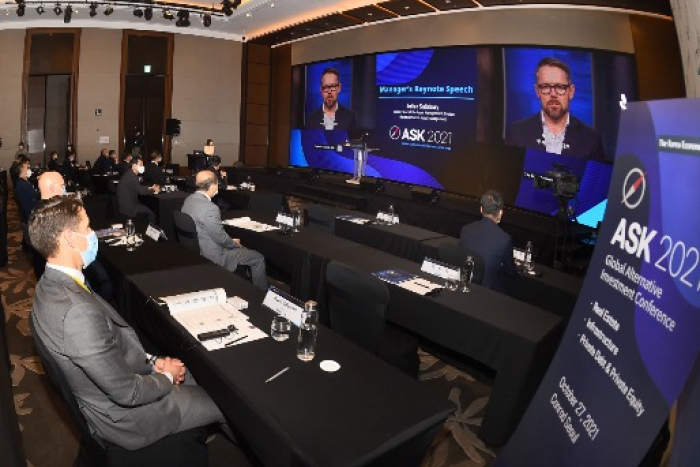Goldman picks three key factors for alternative investment
Goldman Sachs AM global head says digitization, customization, and values-based investing will be more important
By Oct 27, 2021 (Gmt+09:00)
Samsung shifts to emergency mode with 6-day work week for executives


Alibaba eyes 1st investment in Korean e-commerce platform


Blackstone signs over $1 bn deal with MBK for 1st exit in Korea


NPS loses $1.2 bn in local stocks in Q1 on weak battery shares


MBK eyes stake in Korean software developer Tmaxsoft



A number of clear trends will play out for alternatives in the future, notably digitization, customization, and values-based investing, Goldman Sachs Asset Management global head Julian Salisbury said in a keynote speech at ASK 2021, AsiaŌĆÖs biggest alternative investment forum, hosted by the Korea Economic Daily in Seoul on Oct. 27.
ŌĆ£Investors want a more personalized approach where they have more choice about where and why to invest, depending on factors such as the time horizon, risk tolerance and tax status,ŌĆØ he said.
ŌĆ£One of the drivers of customization is the desire to ensure a portfolio matches the values of the individual investor. Each of these factors will drive efficiency into the market around capital formation, which will impact returns and require alternative managers to continue to innovate with new investment products that generate excess returns.ŌĆØ
In addition, he noted constructing a private equity portfolio for the 2020s requires active management, as investors need to be in command of their own risk management and portfolio construction, actively rebalancing and enhancing the portolio over time.
ŌĆ£Given that investors today can access private markets through a variety of delivery mechanisms, private market investors can proactively express themes in areas like ESG and sustainability rather than relying on negative screens to avoid potentially problematic areas,ŌĆØ he noted. ŌĆ£Today you can reflect your preferences and perspectives whether expressed in strategies, geographies, income targets, risk return profiles or your values."
Salisbury also shared his view on values-based investing. Performance dispersion has always been wide in private markets, and the gap between top and bottom performers has only expanded during the pandemic, he explained.
ŌĆ£In many cases, the investors pursuing competitive advantages are seeking to deepen relationships with select managers who can provide scale and efficiency both in terms of access to investments as well as knowledge and data. Many investors are striving to get closer to the underlying portfolio companies, evolving new co-investment programs and capitalizing on their manager relationships to generate proprietary direct opportunities.ŌĆØ
Goldman Sachs has invested more than $4 billion in Korea since the 1970s. The IB has invested in many industries from banking to technology startups in Korea, while introducing advanced alternative investments to Korea and supporting the countryŌĆÖs overseas investment.
Write to Chae-Yeon Kim at why29@hankyung.com
Jihyun Kim edited this article.




